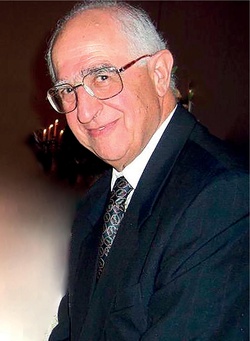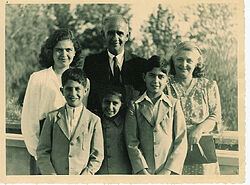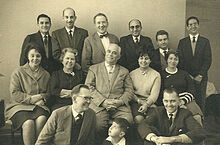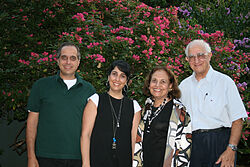Shapoor Monadjem
Shapoor Monadjem | |
|---|---|
 Mr. Monadjem in 2012 | |
| Born | October 3, 1933 Shiraz, Iran |
| Died | November 15, 2018 Maringá, Brazil |
| Nationality | Iranian, Brazilian |
| Occupation | Electrical Engineer |
| NSA member | Brazil 1963 - 1983 |
| Counsellor | Americas 1983 - 1993 |
| ITC member | 1993 - 1998 |
Shapoor Monadjem (October 3, 1933 - November 15, 2018) was a Persian Bahá’í who pioneered to Brazil where he served as a National Spiritual Assembly member, Continental Counselor, and Deputy Trustee of Ḥuqúqu’lláh. He later served on the International Teaching Center.
Biography[edit]

Shapoor Monadjem was born in Shiraz, on October 3rd, 1933 to a distinguished Bahá’í family linked to the the first days of the revelation of the Báb. His mother, Talieh Asdaq, was a daughter of Hand of the Cause of God Ibn-i-Asdaq and granddaughter of the Hand of the Cause of God Ismu'llahu'l-Asdaq. His father, Lotfallah Monajem, was the son of Muhammad Khan Munajjim who served on the Central Spiritual Assembly of Tehran, and grandson of Mirza Muhammad Husayn Munajjim-bashi who met Bahá’u’lláh in Baghdad.[1][2]
During his early childhood, his family moved to Tehran and during the “45 Month Plan” pioneered to the nearby town of Gholhak. In 1950, at the age of 17, Shapoor moved to the city of Abadan for his studies at university, where he earned his degree in electrical engineering whilst working in the Abadan oil refinery.
Although three members of Abadan's Local Assembly who were prominent in the Bahá’í and non-Bahá’í community, had been able to take on the endeavours of pioneering to Ethiopia, Indonesia and Brazil During the Ten Year Crusade, the youth in that community faced more difficulty in doing so, despite the desire many had to leave Iran and teach the Bahá'í Faith around the world. Their financial resources were scarce and obtaining travel visas was extremely difficult, making their objectives some of the most difficult to achieve in the context of the new Plan. In 1956, after a period of prayer, consultation and studying of guidance lasting several days, Shapoor and three other youth decided that they would support each other in their collective pioneering mission. At the first opportunity, if any of them were able to leave Iran, regardless of their financial resources, that individual would be supported by the rest of the group.
In February of 1957, at the age of 23, the possibility opened for Shapoor to pioneer to Brazil. With the resources collected from friends he purchased a ticket and, obeying the Guardian’s last message to the oriental friends and communities, he and a close friend (Mr. Manuchehr Nikoubin) embarked on a ship that would take them to the port of Santos, in southeast Brazil.
After their arrival in Brazil, Manuchehr and Shapoor decided to settle in different cities, the latter moving towards the center of the country, whereas the former would remain closer to the coast. Shapoor soon settled in the remote city of Goiânia, where he managed to secure employment as an engineer for a company that was building a new hydroelectric power plant.
In October of 1957, after the passing of Shoghi Effendi (news that affected Shapoor very deeply), he relates that his mission as one of Brazil’s first pioneers was encouraged and supported by messages from the Bahá’í World Centre, the South American Regional Assembly in Lima, the National Teaching Committee in São Paulo, the National Youth Committee in Bahia, among others.
In 1959 Shapoor married Bahereh Kahrobaí, another Bahá’í pioneer who he had met during his days in Iran, who arrived in Brazil several months after he did, and together they chose to move to the new city of Mogi Mirim, in the state of São Paulo.

In 1963, Shapoor was elected to the National Spiritual Assembly in Brazil [3][4], serving on that body for a period of 20 years at a time when Bahá’í administration in that country was still in its embryonic stages of development.
In 1983, Shapoor and Bahereh had been planning to find another city to pioneer to in Brazil, when he was appointed by the Universal House of Justice to serve as a continental Counsellor. During his years as a Counsellor, Shapoor travelled to dozens of countries within South America and around the world, helping to further the establishment of Bahá’í communities in many new locations.
In 1993, Shapoor was appointed to the International Teaching Centre and moved to Haifa, Israel, where he resided until the completion of his term in 1998.
In 1999, while living in Maringá, his final pioneer post, Shapoor founded an NGO inspired by the document published by the Bahai International Community that same year, “Who is Writing the Future?”.
Service in Later Years[edit]

During the final years of his life, Shapoor devoted a great deal of his time to the study of the laws of Bahá'í consultation and their practical application in the daily lives of people both within and outside of the Bahá'í community. His research eventually led to the creation of a 400-page treatise on the subject, entitled "Challenges and Mysteries of Serving in the Formative Age”- The Searchlight and the Gold Purpose, Vision and Sense of Belonging. This document provides a deep analysis of the possible scope of consultation in numerous different spheres, such as business, community life and the strategic planning of organizations.
Shapoor and his brothers and sister where members of a privileged generation. Their parents and close ancestors were blessed to be very close to the central figures of this Revelation and they became members of the first generation of believers that could feel what is like to be part of one single global human family. For the first time man understands the global scale of his problems and realizes that the systems of governance that he has created are obsolete. He was keen to explore alternatives for those systems. This phrase from the document "Who is Writing the Future" sums up very well how he wanted to serve society when he sought to apply the principles of Bahá'í consultation to corporations and society grassroots movements:
“However great the turmoil, the period into which humanity is moving will open to every individual, every institution, and every community on earth unprecedented opportunities to participate in the writing of the planet’s future.”
Professional Life[edit]

After his arrival in Brazil, Shapoor worked as an engineer in several capacities, and within 3 years of his first position, he was put in charge of the Itumbiara Powerplant in the state of Goias, directing construction as well as managing the staff onsite. While acting as the head engineer for the power plant, he was also made chief of police of the small city of Itumbiara, which at the time had three other police officers.
For the next several years, his work moved him (and after his marriage in 1959 his wife Bahereh) further south, through several cities including Mogi-Mirim, São Paulo, São Roque and, eventually, Maringá.
During most of his professional life, Shapoor worked in the energy and hydro-power generation field, first as a director at ABB (Brown Boveri at that time), a Managing Director at a joint venture he designed between Villares and GE Canada (Vigesa) and later as the CEO and later board member at Sade Vigesa until he resigned to take on his post as a member of the International Teaching Centre in Haifa, in 1993. After his return to Brazil in 1998 he founded a consultancy firm in the energy field called UnionPower S.A.Template:Summary
Death[edit]
Shapoor Died on November 15th, 2018, following several months of struggling with kidney failure and respiratory problems. He is survived by his son, daughter, seven grandchildren and his newborn great-granddaughter.
Upon receiving the news of his passing, Letters were sent on behalf of several institutions, including the Universal House of Justice to the Bahá'ís of the world, detailing his many years of service and calling on communities around the world to hold memorial gatherings in his honour. [5]
References[edit]
Table Of Contents
-
1.1 Biography
-
2.2 Service in Later Years
-
3.3 Professional Life
-
4.4 Death
-
5.5 References